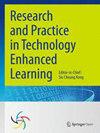“Free rein”学习语言、文化和技术:澳大利亚和日本学生之间的多模式数字文本交换项目
IF 3
Q1 EDUCATION & EDUCATIONAL RESEARCH
Research and Practice in Technology Enhanced Learning
Pub Date : 2023-01-05
DOI:10.58459/rptel.2023.18034
引用次数: 0
摘要
作为澳大利亚-日本基金会项目的一部分,澳大利亚和日本的学生创建并交换了多模态数字文本(mdt),以便通过真实的交际实践学习语言,提高跨文化能力,培养21世纪技能和数字素养。使用早期跨文化多模态数字文本交换研究衍生的四域SPeCT(结构、实践、能力和技术)模型对教师和学生访谈和焦点小组数据进行分析显示,尽管存在与结构、能力和技术相关的某些挑战,但教师和学生对该项目的绝大多数积极态度,其相对自由的性质被视为促进学习。感知到的好处主要是在实践和能力领域:在前者中,这些与选择和自治、个性化和包容性、协作和同伴学习有关;后者涉及练习语言,学习自己和他人的文化,发展21世纪技能和数字素养。这表明,在更广泛的远程协作和在线协作国际学习(COIL)领域,在创建和交换mdt方面给予年轻学习者一定的“自由支配”或自主权是有好处的。本文章由计算机程序翻译,如有差异,请以英文原文为准。
'Free rein' to learn about language, culture & technology: a multimodal digital text exchange project between school students in Australia and Japan
As part of an Australia-Japan Foundation project, school students in Australia and Japan created and exchanged multimodal digital texts (MDTs) in order to learn language through authentic communicative practice, raise intercultural capability, and develop 21st century skills and digital literacies. Analysis of teacher and student interview and focus group data using the 4-domain SPeCT (Structures, Practices, Capabilities, and Technologies) model derived from earlier cross-cultural multimodal digital text exchange research revealed that, notwithstanding certain challenges relating to Structures, Capabilities, and Technologies, teachers and students were overwhelmingly positive about the project, whose relatively free nature was seen as fostering learning. The perceived benefits were largely in the domains of Practices and Capabilities: in the former, these related to choice and autonomy, personalisation and inclusivity, and collaboration and peer learning; in the latter, they related to practising language, learning about one’s own and others’ cultures, and developing 21st century skills and digital literacies. This suggests that within the wider field of telecollaboration and COIL (collaborative online international learning), there is merit in young learners being given some ‘free rein’, or autonomy, in creating and exchanging MDTs.
求助全文
通过发布文献求助,成功后即可免费获取论文全文。
去求助
来源期刊

Research and Practice in Technology Enhanced Learning
Social Sciences-Education
CiteScore
7.10
自引率
3.10%
发文量
28
审稿时长
13 weeks
 求助内容:
求助内容: 应助结果提醒方式:
应助结果提醒方式:


